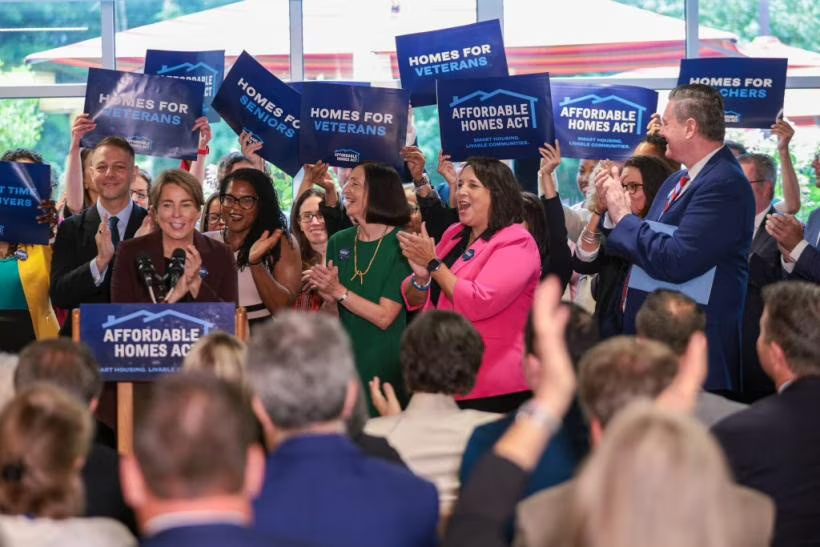
15 Aug 2024 Affordable Homes Act doubles the Commonwealth’s Historic Tax Credit program to bolster affordable housing development
Provisions stipulated in the Massachusetts Affordable Homes Act are a powerful reminder of the potential for historic preservation to help relieve the current housing crisis. On August 6th, Massachusetts Governor Maura Healey and Lieutenant Governor Kim Driscoll signed the wide-ranging $5 billion measure into law as an emergency effort to accelerate the development of affordable housing, providing financial incentives to municipalities and developers. Notably, this law also includes a provision that doubles the funds available for the Massachusetts Historic Rehabilitation Tax Credit Program.
The ongoing housing crisis in Massachusetts has only compounded in recent years as land, building materials, and the cost of labor have risen to such a peak that developers only profit by building big and building luxurious. For renters or buyers looking for something somewhere in the middle, they are hard-pressed to find an affordable option in Massachusetts. With the signing of the Affordable Homes Act into law, Governor Healey is providing incentives to developers to build the housing that Mass residents need.
Approximately $5 billion dollars in housing investment will support the development, preservation, and rehabilitation of more than 65,000 affordable, mixed-income housing, housing for the elderly, the disabled, for veterans, for the unhoused, and low-to-moderate income citizens. Zoning reform will allow for the construction of “accessory dwelling units” on single family lots to accommodate the need for housing for both young and aging populations. This law also includes the allocation of $800 million to create the Affordable Housing Trust Fund, which supports private housing projects that provide for the acquisition, construction or preservation of affordable housing. $50 million has also been directed to create and maintain first-time home buyer opportunities.
Massachusetts’ historic preservation advocates applauded Gov. Healey’s signing of this act into law as it offers the greatest financial commitments to date for preserving and rehabilitating historic properties across Massachusetts. The law expands the cap on funds available for Massachusetts Historic Rehabilitation Tax Credits (MHRTC) from $55 million to $110 million annually until 2030. The expansion of the state’s Historic Tax Credit program, which already allocates 25% of the funding cap for affordable housing projects, boosts the funding only available for affordable housing from approx. $14 million to $27 million annually.
The MHRTC provides up to a 20% tax credit for qualified rehabilitation expenditures on income-producing historic properties. The expansion of the program is designed to encourage developers to rehab historic properties in order to cover a significant portion of their project costs. State and Federal Historic Tax Credits are sold to private investors and in exchange, the funds are reinvested into historic preservation projects. Tax credits have become a vital source of funding for leveraging private investment in historic preservation, especially when coupled with the federal 20% historic rehabilitation credit.
A 2021 study from the National Trust for Historic Preservation entitled “The Performance of Affordable Housing Provisions in State Historic Tax Credits” used Massachusetts, Maine, and Delaware as case studies to analyze the use of tax credits to create affordable housing. In Massachusetts, rehabilitation of the Fitchburg Yarn Works factory, which was a mixed-income project that utilized the affordable housing set-aside within the MHRTC program was used to build 96 units, 40% of which are affordable housing.
“Massachusetts has these incredible physical structures that have been rehabilitated into housing at a price that’s affordable to people with normal paychecks, said Lawrence Curtis, President of Winn Development, the developer of Fitchburg Yarn Works. “These are great places to rehabilitate, great places to live in and, collectively, one building at a time, they are remaking communities.”
The passage of the Affordable Homes Act also prioritizes development of housing that is environmentally sustainable, electronically carbon-neutral, and climate resilient with additional climate-friendly incentives for the development of housing. Given the considerable vacancy rate statewide in commercial office buildings, preservationists also applaud the Act’s inclusion of a commercial property conversion program and a commercial property conversion tax credit which can further motivate developers to convert historic commercial buildings from office to housing.
In the passage and signing of this bill into law, Governor Healey has established new and expanded avenues for the funding of affordable housing and the preservation of our state’s shared cultural heritage.



